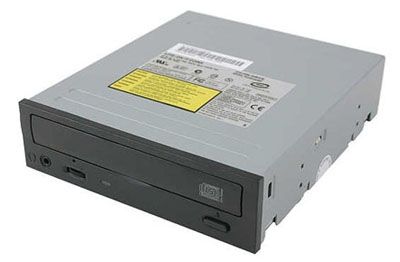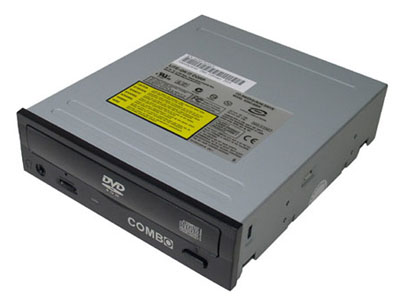Buyer's Guide - Entry Level, October 2004
by Jarred Walton on October 6, 2004 12:05 AM EST- Posted in
- Guides
Optical Drives
Prices on optical drives have really bottomed out, and it is now possible to pick up a DVD burner with dual layer support for under $70. We do not feel that a budget system actually needs a DVD recorder, but the option is there should that sort of thing interest you. The only other thing worth mentioning is that you should make sure to get an optical drive that matches the front of your case. Since the two cases that we have selected are black (as you will see later in the guide), we went with black optical drives. Beige models of the same drives are also available.While you might be able to find a CD-ROM drive for less than half the cost of a CD-RW, we recommend that you "splurge" on the CD-RW for a couple reasons. First is that you never know when you might decide to start creating your own CDs, be they music, photo, or other content. Second, CD-R discs are extremely cheap and relatively fast, and they are far more reliable than floppy disks for storing data. Making periodic backups to a CD-R is relatively simply and painless, and each disc can hold a lot of data. There really is no reason not to get one.

Office CD-RW Recommendation: Lite-On SOHR-5238S 52x32x52x CD-RW
Price: $28 shipped
We have chosen to recommend a Lite-On CD-RW drive for this month's budget system. This change is not so much due to an inherent superiority of the Lite-On drive, but instead, it is meant as an alternative to previous recommendations. Nearly all current 52X CD-RW drives are within a few dollars of each other in price, and performance and reliability are all very close together as well. Aopen, ASUS, Sony, Samsung, Pioneer, Plextor, NuTech... for CD-RW drives, we have not seen any major issues that would cause us to seriously recommend one drive over another. Some users also report getting better burn rates and quality by using unofficial BIOS updates - proceed at your own risk if you decide to try out any of these mods.

Gaming CD/DVD Alternative: Lite-On SOHC-5232K CD-RW/DVD Combo
Price: $45 shipped
For gamers, we highly recommend getting a DVD/CD-RW or even a DVD+/-RW drive. There have been a few games recently that have appeared with special DVD-ROM versions, and even though the content is the same, worrying about only one DVD is more preferable to shuffling through four or five CDs, while you try to figure out which is the one that you need to have in the drive to be able to play your game. We can only hope that more future titles will begin to ship on a single DVD instead of multiple CDs, and to facilitate that, we suggest that all gamers have a system that can at least read DVDs. You also get the added benefit of being able to watch movies on your computer, of course. 8X DVD+R drives start at about $10 more, but as we mentioned earlier, we do not really feel that they are necessary, so we are cutting our costs a bit for now.










53 Comments
View All Comments
kmmatney - Wednesday, October 6, 2004 - link
We are going completely small form factor at my office, using either the ASUS Terminator or, lately, ASUS T2-P with Celeron-D. They've all worked great, and no problems using on-board graphics.The ASUS Terminator + Duron is simply an incredible value. The ASUS T2-R is also nice, with ATI Radeon 9100 graophics.
kherman - Wednesday, October 6, 2004 - link
kherman - Wednesday, October 6, 2004 - link
Left kinda confused. I see alot of areas I simply didn't like. In particular, for a true Office rig, where data intergretty is VERY important, I'd suggest 2 hard drives and a software RAID solution. Same total cost for hard drives, but it's justfied in terms of budget. Spend the same amount. for gaming, go for fast loading. For office, go for redundancy. The Office rig would actually have more alloted to the hard drive, but isn't that the critical component in an office rig?I say this every time I see a write up. You really need to start mentioning it, even if it's simpyl an alternative office solution that costs more. Most people using a PC for home office use, don't have a server running RAID 5 available and it almost seems as though it's an assumption.
Other than this, I loved that article. Also, for home office, I can't see recomending 17" monitors. You need to generally run higher resolution and see more of the screen to be efficient in a home office.
To be honest, I have to say that "a "budget rig" for office shouldn't be much cheaper than he gaming rig. Monitors and redundancy are important factors here where gaming rigs need a killer video card.
Please consider this in the future.
boomerang - Wednesday, October 6, 2004 - link
Very happy with the more in-depth explanations and choices given in the guide. I very much depend on these guides when building systems.You are to be commended for a job well done!
iversonyin - Wednesday, October 6, 2004 - link
since we in the entry level budget, why not get a generic case+ PS. generic case usually got for ~$35i would not run XP with 256 MB RAM even its only for office use. IMO
PrinceGaz - Wednesday, October 6, 2004 - link
On the last page in the Additional Alternatives table, the Power Supply Upgrade has the wrong item name.Iger - Wednesday, October 6, 2004 - link
Thanks for the nice guide, I love explanations too :)About monitors - there actually are Samsung 795 DF ones, which handle 1280x1024@75 for a few more $ :)
Gholam - Wednesday, October 6, 2004 - link
$14, Bayfield is just way too expensive - why not use a D865GVHZ if you're determined to go Intel?Gholam - Wednesday, October 6, 2004 - link
$14, Bayfield is just way too expensive - why not use a D865GVHZ if you're determined to go Intel?Scarceas - Wednesday, October 6, 2004 - link
I've had seen at least one business app that didn't run right on an nForce motherboard. It was wierd.Anyway, I never seem to have any trouble with stability or configuration when using an Intel-branded motherboard with an Intel CPU.
It does cost a bit more, but the in the total cost of ownership equation, the hardware itself is definitely not the largest factor, especially on a budget near this one.
The previously mentioned application is a good case in point: the money saved in hardware was easily ate up in service/support to troubleshoot the program.
I like the Intel D865GBFL motherboard, and if you're going budget, a Celeron D 320 will fit nicely ($165 shipped from Newegg).
In an office environment, the performance delta is not so critical, and I don't mind spending $35 more if it reduces support issues.
Just something to conside...